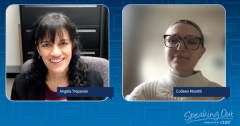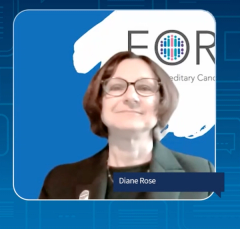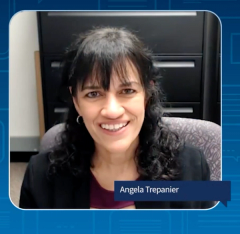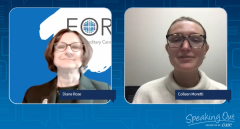
Making Strides and Breaking Down Barriers in Genetic Testing for Breast Cancer
As a part of its “Speaking Out” video series, CURE® spoke with genetic counselor, Angela Trepanier, on behalf of FORCE, about disparities seen in genetic testing for caner.
Episodes in this series
Transcription:
Colleen Moretti: What are some disparities we see in genetic services for breast cancer?
Angela Trepanier: Well we know from looking at research that individuals who are white are more often the ones who present for genetic counseling and testing, especially based on family history versus having a personal history of cancer. When we look at other populations, such as people who are African American, Hispanic or Asian, more often if they're referred for genetic counseling and testing is after they've had a cancer. And so that's one disparity that affects people from different races and ethnicities. And then the other disparities that we see in other populations that have been traditionally marginalized, like individuals from the LGBTQIA+ population. The ones that affect them in all aspects of health care are also prevalent in genetic services. And so those are things that we need to address to make sure that everybody has equitable access.
Moretti: How can these disparities affect patients and their families?
Trepanier: The main impact when somebody doesn't get referred at all is that that family doesn't have an opportunity to identify their risk for hereditary cancer and knowing that you're at hereditary risk has a big impact on screening and the potential to take preventative measures. And so, if somebody isn't informed about that, they don't have those opportunities, and they're more likely than to present with a cancer diagnosis, instead of finding out that they're at risk and potentially preventing that cancer. And we have seen that in the literature and that's why people who are Black and Hispanic and Asian, some studies have been shown to be more likely to present with a cancer diagnosis. And that means that that person has less of an opportunity to really prevent that cancer. And it also means that other people in the family might not find out about their risk until somebody is going through a cancer diagnosis, which can be a really hard time to make decisions about looking at your own risk when somebody that you're close to is going through that kind of situation. So that is a huge deficit that we want to correct by making sure that people know what the risk factors are for being at risk. And there are things like early age of onset in the family, somebody who has multiple cancers that are related to one another like breast and ovarian cancer and there's things like male breast cancer. Anybody who has a variant cancer, anybody who has pancreatic cancer, we want to make sure that if there's that kind of family history or person that has any of those cancers, we want to get them referred as soon as possible so they can avail themselves of measures that might actually save their lives.
Moretti: What needs to be done in order to close those gaps and disparities?
Trepanier: Some of them are policy things. I saw in the literature was that sometimes when people don't have genetic counseling and testing, it's because they don't have adequate insurance coverage. So, we want to make sure that we have insurance coverage that really covers everyone who's potentially at risk. So that's one factor and we're making some strides in that regard, but that's really important.
And then another factor is just bias of providers. Some of the literature says that sometimes providers just think that people who are Hispanic or Black or Asian may not want genetic counseling and testing and so they don't make that referral. Or they don't ask about family history, or they assume that if that somebody wouldn't want genetic testing because they're worried about discrimination, so we need to work with educating all of us, me included, about those potential biases and correcting those biases. And then organizations like FORCE which can support people and provide them with information. The advocacy that they're doing to help people recognize the risk factors and get them to actually ask for genetic counseling and testing and give them the tools to know how to do that. That is something that can address those disparities as well.
Moretti: What kind of resources can FORCE provide for those patients experiencing disparities in genetic testing?
Trepanier: Number one FORCE provides a community of people who are experiencing hereditary cancer in some way shape or form so they have experience in talking to people about: Why they might want to consider genetic counseling and testing, how they might reach out to their primary care physician if they're not getting the referral they want, what are good providers that can provide inclusive care. All of those things can help somebody access genetic counseling and testing and hopefully feel that they can trust the provider that they're seeing. And then FORCE also provides information about why do you want to know that information? Sometimes that's the biggest barrier. Somebody might say, why would I want to know that I'm at risk, I would just worry about it. But there really are things that you can do to reduce your risk. If you find out that your risk is increased, and FORCE has all that information. And then I think the other thing that FORCE really provides is heart. It's a place for the people that are part of that organization. Everyone I've interacted with really understands what this means at a personal level, and they're there to support people who want information and who might be starting this journey. So knowing that you have somebody in your corner is really breaks down a lot of barriers to accessing services.
This transcription has been edited for clarity.








